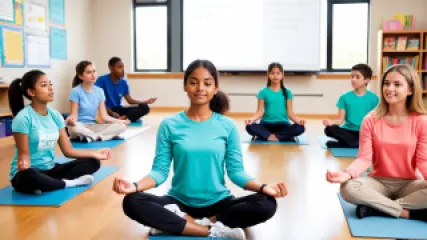How Can Mindfulness Benefit Students in the Classroom?
In the fast-paced, high-stress environment of modern classrooms, the concept of mindfulness has emerged as a powerful tool to support student well-being and enhance academic performance. As an educational researcher and advocate for holistic student development, I firmly believe that the integration of mindfulness practices can bring about profound benefits for students of all ages.
At the heart of mindfulness lies the practice of cultivating present-moment awareness, a skill that enables individuals to navigate the challenges of daily life with greater clarity, focus, and emotional resilience. In the context of education, the application of mindfulness can have a transformative impact on students, equipping them with the necessary tools to thrive both academically and personally.
Enhancing Cognitive Abilities and Academic Performance
One of the primary ways in which mindfulness can benefit students in the classroom is through its positive impact on cognitive abilities. Multiple studies have demonstrated that the regular practice of mindfulness can lead to improvements in attention, memory, and information processing, all of which are essential for academic success.
By training students to be more attentive and focused, mindfulness practices can help them better absorb and retain the material being taught in the classroom. This, in turn, can translate into higher test scores, better grades, and a deeper understanding of the subject matter.
Furthermore, mindfulness has been shown to enhance problem-solving skills and creative thinking. When students are able to quiet their inner chatter and focus solely on the task at hand, they unlock new pathways for innovative solutions and original ideas. This can be particularly beneficial in subjects that require critical thinking, such as science, mathematics, and the humanities.
Fostering Emotional Regulation and Stress Management
The classroom environment can be a breeding ground for stress, anxiety, and emotional turmoil, especially for students navigating the complexities of adolescence or the rigors of higher education. Mindfulness practices offer a powerful antidote to these challenges, empowering students to develop greater emotional regulation and resilience.
By teaching students to observe their thoughts, feelings, and physical sensations with non-judgmental awareness, mindfulness can help them better understand and manage their emotional experiences. This, in turn, can lead to decreased levels of stress, anxiety, and depression, all of which can have a detrimental impact on academic performance and overall well-being.
Moreover, mindfulness-based interventions have been shown to enhance empathy, compassion, and social-emotional skills. As students learn to cultivate greater self-awareness and understanding, they can also develop stronger interpersonal relationships, improved communication skills, and a greater sense of community within the classroom.
Promoting Holistic Well-being and Life-Long Learning
Beyond the immediate academic benefits, the integration of mindfulness in education can have far-reaching implications for a student's overall well-being and personal development. By nurturing the mind-body connection and fostering a deeper sense of self-awareness, mindfulness can help students develop the skills and resources necessary for lifelong learning and personal growth.
For example, the practice of mindfulness can lead to improved physical health, as students learn to manage stress, enhance sleep quality, and adopt healthier lifestyle habits. This, in turn, can positively impact their energy levels, immune function, and overall physical well-being, enabling them to better navigate the demands of academic life.
Furthermore, mindfulness can cultivate a greater sense of purpose, meaning, and resilience in students. As they learn to navigate life's challenges with a more grounded and compassionate perspective, they can develop the inner resources to overcome obstacles, embrace setbacks as opportunities for growth, and find joy and fulfillment in their educational journey.
Implementing Mindfulness in the Classroom
Given the overwhelming evidence in support of the benefits of mindfulness in education, it is crucial that schools and educational institutions take proactive steps to integrate these practices into their curricula and school cultures. This can be achieved through a multifaceted approach that includes:
- Teacher Training and Professional Development: Providing educators with comprehensive training in mindfulness-based techniques and strategies for effectively incorporating them into their teaching practices.
- Classroom-Based Mindfulness Programs: Implementing structured mindfulness programs that offer students regular opportunities to engage in mindfulness exercises, such as breathing meditations, body scans, and mindful movement activities.
- Whole-School Initiatives: Fostering a school-wide culture of mindfulness by integrating mindfulness practices into various aspects of the school community, from administrative meetings to extracurricular activities.
- Parental Involvement and Community Engagement: Collaborating with parents and the broader community to promote the benefits of mindfulness and create a supportive ecosystem for students to thrive.
It is important to note that the implementation of mindfulness in education should be done with sensitivity, cultural awareness, and a deep respect for the diverse needs and backgrounds of students. By adopting a holistic, student-centered approach, schools can ensure that mindfulness practices are integrated in a way that is inclusive, accessible, and tailored to the unique needs of their student population.
Conclusion: Unlocking the Transformative Potential of Mindfulness
As an educational researcher and advocate for holistic student development, I am deeply committed to the integration of mindfulness practices in the classroom. The overwhelming evidence showcases the remarkable benefits that mindfulness can bring to students, from enhancing academic performance to fostering emotional well-being and promoting lifelong learning.
By empowering students to cultivate present-moment awareness, self-regulation, and a greater sense of purpose, mindfulness can truly unlock the transformative potential of education. As we continue to navigate the ever-evolving challenges of the 21st-century classroom, it is crucial that we embrace the power of mindfulness to support the holistic growth and development of our students.
Through the widespread adoption of mindfulness-based approaches in education, we can create a learning environment that nurtures the whole child, equipping students with the tools they need to thrive academically, emotionally, and socially. It is time to embark on this transformative journey, and I am confident that the benefits of mindfulness in education will be felt for generations to come.






